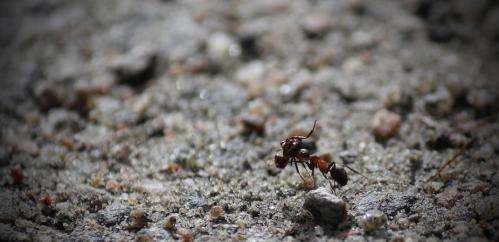Ant undertakers are always ready to take one for the team

Ants have been quite successful, evolutionarily speaking. They are found on every continent, apart from Antarctica. They fill a range of ecological niches, from the tops of towering rain forest trees to kitchen floors. One reason for this success is their social organisation, with related ants working together in densely packed colonies.
But as humans have also found, living together brings costs as well as benefits. One of these costs is an increased vulnerability to infectious diseases, which can spread rapidly because of regular contact with each other. This becomes critical, especially when dead bodies remain undisposed.
Humans have developed elaborate rituals for the disposal of dead bodies, which in part relate to the need to reduce the spread of diseases. As a result of this, in many cultures the collection and disposal of bodies falls to a particular profession who specialise in this process.
In a paper in Animal Behaviour, Belgian researcher Lise Diez and her colleagues investigated whether ants, like humans, needed specialists to dispose of their dead.
Researchers collected colonies of the common red ant Myrmica rubra from the wild and brought them into a lab. Ant corpses were then presented to these colonies, and the worker ants that chose to collect and transport these corpses were marked (with tiny plastic printed discs). The behaviour of these marked ants was then recorded to see if they were any different from the ants that had not been seen to carry corpses.
The researchers found that corpse-carrying ants were not just undertakers, they also foraged for food. In fact, when the rates of corpse removal for individual ants were measured over periods of up to two weeks, if an ant had carried a corpse, then it was no more likely than other ants to carry another corpse. So it seems that corpse carriers are just foragers that have been temporarily diverted from their usual activities. But some ants showed short-term specialisation on corpse removal, repeatedly carrying corpses during short periods of time (less than one hour).
Why not have full-time specialists? Diez suggests this might be because corpses are not very common in and around nests in the wild. Instead of having a small number of committed formicine undertakers, who might have to hunt around for long periods of time for a corpse, it is more efficient for any ant that encounters a corpse to transport it. This tactic also has the advantage that the colony is able to swiftly respond when there are a large number of dead ants, since the whole workforce is available for a clean-up operation.
The researchers also found that the corpse-carrying ants were much more likely to be found outside the nest. Even those corpse carriers that were observed inside the nest tended to loiter near the nest entrance, rather than making their way into the nest interior. This means they are less likely to encounter the eggs and larvae of the colony, which are vulnerable to disease. After all, you would not want undertakers trooping through your nursery.
The fact that corpse carriers, which are at risk since they are potentially exposed to disease, are part of the foraging "caste" makes sense, since these tend to be older ants, which are more expendable for the colony. Foraging workers may also have more active immune systems since they need to deal with pathogens during food collection, which would help them to deal with the risks associated with corpse collection.
We should not think ourselves unique in having specialised members of society to deal with our dead. Both ants and humans have a need to dispose safely of dead bodies. Ants do it without making too much of a fuss.
More information: "Who brings out the dead? Necrophoresis in the red ant, Myrmica rubra." Lise Dieza, Hélène Le Borgnea, Philippe Lejeuneb, Claire Detraina Animal Behaviour Volume 86, Issue 6, December 2013. dx.doi.org/10.1016/j.anbehav.2013.09.030
Journal information: Animal Behaviour
Source: The Conversation
This story is published courtesy of The Conversation (under Creative Commons-Attribution/No derivatives).
![]()



















